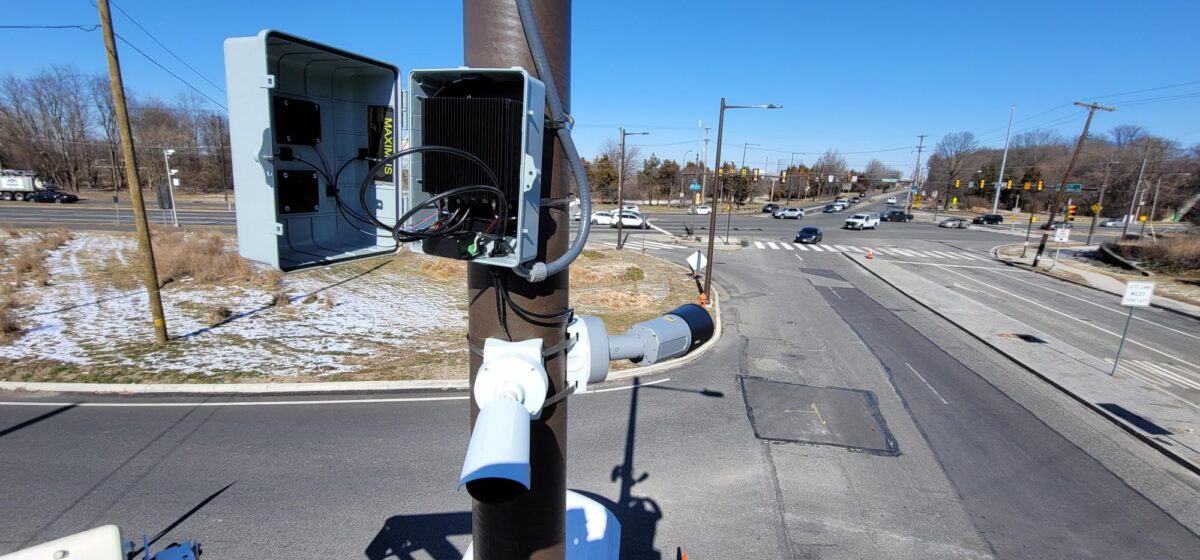Typically, the term refers to using Internet of Things technology, like sensors, to bring solutions to a city’s problems. But the president and COO of Rekor Systems, a Maryland-based AI technology company focused on improving transportation infrastructure, takes it more literally: He thinks cities are already smart because smart people live in them.
You could say both interpretations ring true for Philadelphia’s Navy Yard, the 1,200-acre site at the southern tip of Philadelphia that 150 companies call home — a mini smart city within the city.
Last spring, Rekor launched a pilot with its AI smart sensors to gather data about transportation in the Navy Yard to support new development.
What does Rekor do?
Desharnais told Technical.ly he doesn’t think people really want to live in the too-tech-forward type of smart cities where they need to constantly side-step robots. Rather, a smart city allows residents multiple options to get to their destination, and they don’t necessarily need to drive everywhere.
Rekor works with departments of transportation, local government and commercial businesses that want to rethink roadways and transportation in their city. The company uses AI technology to gather information about what is moving on the roads and how those factors interact, and flag any potential issues on the roadways, then present that information to roadway managers and the like so they can make informed decisions.
“We collect data, we connect data, we transform that into insights and give that in a way that is understandable and useful and accessible to departments of transportation that desperately need it,” he said.
What’s happening at the Navy Yard?
The Navy Yard is no stranger to the Philly tech community. Ben Franklin Technology Partners is based there, Rite Aid opened a corporate collaboration center there last summer, and in December, it became the test site for a new autonomous shuttle.
Rekor has a partnership with Amazon Web Services and was connected to the Philadelphia Industrial Development Corporation (PIDC), which runs the Navy Yard, through AWS. The company’s leaders had conversations with the Philly Streets Department, whose own leaders wanted to see Rekor’s technology in action, and suggested that the Navy Yard would be a good place to do so.
Desharnais calls the Navy Yard a “microcosm” of the bigger city, with all the same transportation issues that appear when there is a concentration of vehicles, pedestrians and bicycles.
Desharnais calls the Navy Yard a “microcosm” of the bigger city, with all the same transportation issues that appear when there is a concentration of vehicles, pedestrians and bicycles.
“The folks that are managing the Navy Yard, they want to get a grip and a handle on what is moving on the roadway,” he said. “So they can actually enhance public safety and security, be able to enhance, or improve greenhouse gas emissions to be able to understand the patterns of traffic that are happening so that they can they can optimize their roadways for congestion.”
Rekor installed its Rekor One system of smart sensors across the Navy Yard to track what is happening on those roadways and provide analytics for that information. The system also collects existing data from Google and Waze, work zone data, connected vehicle data and event data, for example. Rekor shares that information with roadway managers so they can make informed decisions about how to manage transportation.
The next step for this project is partnering with Penn State to turn the Navy Yard into a living lab, where they will test out new AI technology.
“We’re very intentional about bringing in Penn State, making this a living laboratory for AI right at the Navy Yard,” said Charlie Degliomini, EVP of government relations and corporate communications at Rekor. “We’ve just gotten to this grounding point where we were saying, all right, technology’s there. It’s live. What else can we do to capitalize on this amazing experience that we’re seeing, all the great data that we’re seeing? But let’s bring in Philly Streets. Let’s bring in Wharton. Let’s bring in Penn State to be learning with us, side by side.”
So, yes: Desharnais does think the Navy Yard is already “smart.” But from here, tech stakeholders will keep collecting information to improve that intelligence.
Sarah Huffman is a 2022-2024 corps member for Report for America, an initiative of The Groundtruth Project that pairs young journalists with local newsrooms. This position is supported by the Lenfest Institute for Journalism.Join our growing Slack community
Join 5,000 tech professionals and entrepreneurs in our community Slack today!
Donate to the Journalism Fund
Your support powers our independent journalism. Unlike most business-media outlets, we don’t have a paywall. Instead, we count on your personal and organizational contributions.

Traditional PPE isn’t made for everyone. Here’s how one startup is fixing it.

Comcast introduces ultra-low lag Xfinity internet that boosts experiences with Meta, NVIDIA and Valve

This Canadian startup with a network of 100,000 is helping international college students find their careers



